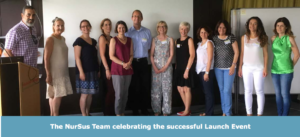Hi, my name is Norma, I work at Esslingen University. About six years ago I was very fortunate to team up with some amazing people from the universities of Plymouth, Jaen and Maastricht along with colleagues from Esslingen. These team members are all linked in some way to promoting health and bring with them expertise from a range of subjects: nursing, biology, anthropology, sociology, marine science, environmental health science, epidemiology, global health and psychology. Our common cause is that we all care very much about our health, the health of others and of our environment. So we decided to try to do something to make nurses aware of the links between sustainability, climate and change and health.
So why nurses?
Sustainable development is a concept vital to healthcare, because in providing healthcare we compromise public health and make a contribution to climate change. At the moment the EU health sector alone accounts for at least 5% of total CO2 emissions. Nurses make up one of the largest professions in Europe. They are agents of change and have a remit to promote health and control the use of health resources.
So together as a group and with funding from Erasmus+we developed the NurSusTOOLKIT.
The aim of the TOOLKIT is to enhance the availability of an evidence-based, online, free access learning offer in 6 languages on Sustainability Literacy and Competency (SLC) in Nurse Education.
For the next few weeks I’ll be travelling through Australia and New Zealand giving presentations and carrying out workshops on the TOOLKIT and finding out what’s happening with sustainability, climate change and health on the other side of the world.
‘Sustainability’ means lots of different things to lots of people, so here’s what the members of the NurSus team mean when talking about sustainability:
NurSuS Definition:
“Designing and delivering health care that meets todays health and health care needs of individuals and populations without compromising the ability of future generations to meet their own health and health care needs;
this requires the provision of health care that recognizes and respects the dependence of our health on the earth’s ecosystems, without resulting in unfair or disproportional impacts within society.” (NurSuS, 2015)
First stop – Sydney 🙂

